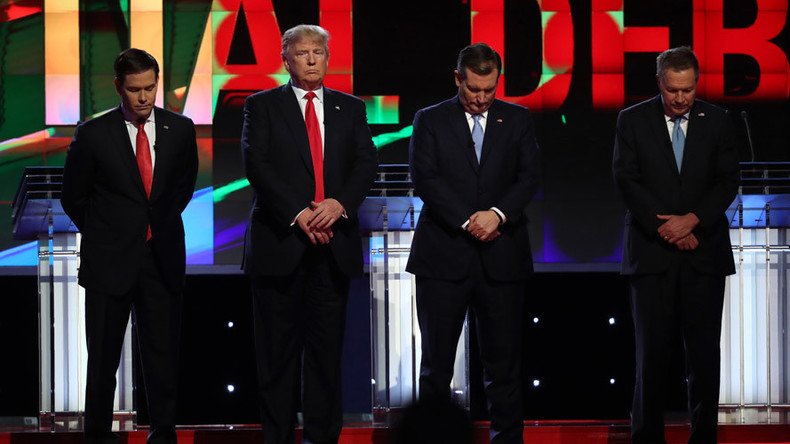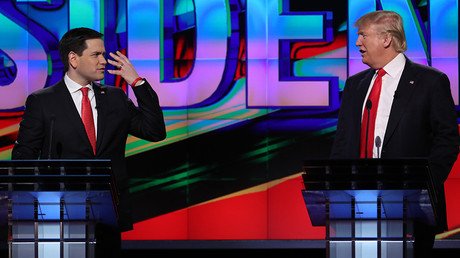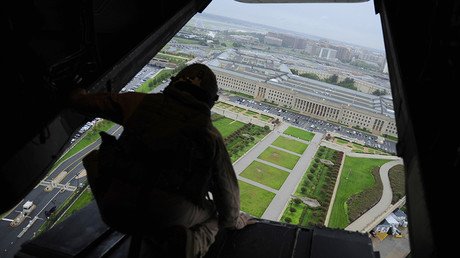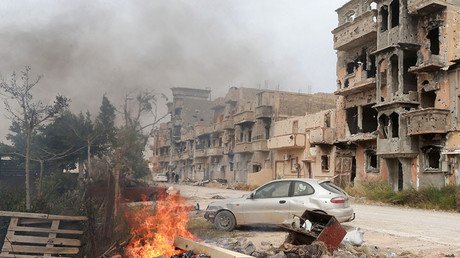Republican pres candidates: Ground war with ISIS now!

The four remaining Republican presidential candidates clamored during their latest debate to be considered most likely to begin another massive ground war in the Middle East, this time in pursuit of an end to jihadist group Islamic State.
On Thursday night, during their 12th presidential debate, GOP candidates Donald Trump, Ted Cruz, Marco Rubio and John Kasich each touted how draconian they would be in countering Islamic State (IS, formerly ISIS/ISIL) in regions of Syria and Iraq the group has come to control in recent years.
Despite a year and a half of airstrikes on supposed IS targets by a US-led coalition of nations, the Republican contenders scoffed at the Obama administration's military efforts aimed at IS, vowing to send waves of US troops "to wipe them out," as Kasich put it.
Trump, the frontrunner for the Republican nomination, said that as president, he would have his eye on sending "20,000 to 30,000" US troops to Iraq and Syria to dismantle IS, depending on advice from US generals. He appealed to the idea of reclaiming pride in US military power after drawn-out wars in Afghanistan and Iraq that have not offered Americans the clear-cut "win" or glory that came following World War II, feelings for which many Americans, especially Republicans, hold in high regard.
“We don't fight like we used to fight,” Trump said. “We used to fight to win. Now we fight for no reason whatsoever. We don't even know what we're doing.”
Donald Trump: We have to "knock the hell" out of #ISIShttps://t.co/Y1FfRsAwKO#GOPDebatehttps://t.co/YLcOVehaGv
— CNN (@CNN) March 11, 2016
Trump suddenly endorses 20,000-30,000 US troops to fight ISIS after saying for last year that air strikes and "take the oil" enough.
— Max Boot (@MaxBoot) March 11, 2016
Ohio Governor John Kasich embodied the glib ambiguity with which candidates described their military plans to counter IS, saying the US must "bring all the force you need" to defeat the sprawling jihadist network borne out of Al Qaeda in Iraq, which coalesced and then flooded Iraq following the US invasion of that nation in 2003.
“It has got to be ‘shock and awe’ in the military-speak,” he said. “Then once it gets done, and we will wipe them out, once it gets done, it settles down, we come home and let the regional powers redraw the map if that's what it takes.”
Leaked ISIS ‘entry forms’ could expose 22,000 terrorists from over 50 states https://t.co/ujGZr4Tqespic.twitter.com/qjWzoQYmuN
— RT (@RT_com) March 10, 2016
Senator Ted Cruz of Texas, running second behind Trump in the race, said the next US president must "do whatever is necessary to utterly defeat ISIS," claiming the Obama administration's airstrike regime and arming of so-called "moderate" fighters on the ground in Syria is not enough.
“Right now we're not using a fraction of the tools that we have,” he said. “We're not using our overwhelming air power. We're not arming the Kurds. Those need to be the first steps. And then we need to put whatever ground power is needed to carry it out.”
Cruz: We need to do whatever is necessary to utterly defeat ISIS. Watch live: https://t.co/jVsgxIyV1B#GOPDebatehttps://t.co/A3CgiPW103
— CNN Breaking News (@cnnbrk) March 11, 2016
The US is indirectly arming Kurds in northern Iraq via the central government in Baghdad, as the Kurds do not have a nation-station. Directly arming Kurds, as Cruz and other Republicans have called for and even failed to pass in Congress, is against the law, specifically the Foreign Assistance Act and Arms Export Control Act.
As of March 9, the US-led coalition of nations fighting IS has conducted 10,870 airstrikes against IS targets, with more than 7,000 of those strikes occurring in Iraq. The US has conducted 8,321 of those total strikes. As of February 15, the cost of "kinetic operations" against IS, which began in August 2014, was $6.4 billion, according to the US Department of Defense.
Trump, like the other candidates, promised to build "a stronger military, much stronger," while Rubio said he would rebuild the US armed forces, as "Barack Obama is gutting our military."
A recent poll found that a rising number of Americans believe the US spends too little on the Pentagon's operations despite a military budget greater than the next seven countries' budgets combined. Republicans were more than three times as likely as Democrats to think that the US spends too little on its military, with 66 percent of Republicans saying so.
Trump, meanwhile, was forced to defend his past assertion that the world's Muslims are at odds with the United States. Trump has infamously said he would consider a registration system for Muslims in the US and possibly limit travel of Muslims into the country.
When asked if he meant all 1.6 billion Muslims in the world, Trump said, "I mean a lot of them. I mean a lot of them," to a round of applause from debate attendees.
Trump conflates ISIS will all Muslims. This is nuts.
— Jeffrey Goldberg (@JeffreyGoldberg) March 11, 2016
Rubio, the senator from Florida, decried rhetoric like Trump's that, he said, is alienating "friendly Muslims" in the world.
"If you go anywhere in the world you're going to see American men and women serving us in uniform that are Muslims and they love America," Rubio said.
Trump responded, saying, "I don't want to be so politically correct. I like to solve problems. We have a serious, serious problem of hate. There is tremendous hate. There is tremendous hate."
Marco Rubio challenged Donald Trump's assertion that Islam hates America #GOPDebatehttps://t.co/kukFjK34KQ
— NowThis (@nowthisnews) March 11, 2016
The candidates also excoriated what they called an unaccountable, oversized Department of Veterans Affairs, which has been accused of underserving the nation's ever-growing numbers of military veterans in need of medical services.
















